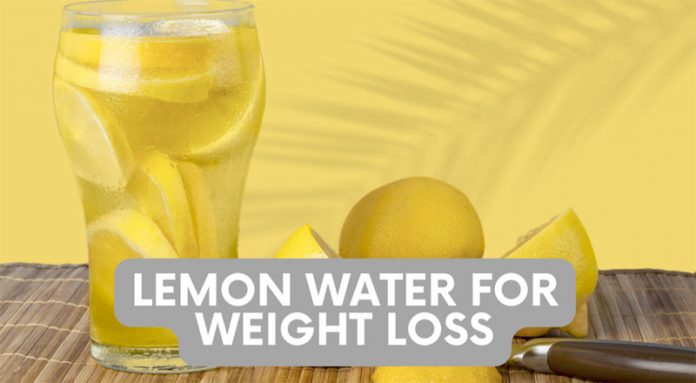Lemon water has become popular for those looking to lose weight, but why does it work? From its natural diuretic properties to its ability to boost metabolism [1], lemon water is a simple and effective way to support your weight loss goals. Whether you’re a seasoned dieter or just starting your weight loss journey, lemon water is an excellent addition to your routine that can provide actual results.
We will examine the science behind lemon water’s ability to reduce weight in this article and tips for adding it to your diet. So, read on to learn more about the benefits of lemon water for weight loss!
Water and Thermogenesis: How it works?
Thermogenesis is the procedure through which the body generates heat and expels calories. Drinking water, especially cold water, can increase thermogenesis and boost metabolism. This is because the body needs to work to warm the water to body temperature, burning calories. The amount of calories burned through thermogenesis from drinking water is relatively small. However, it can still affect weight loss efforts and other healthy habits. [2] Additionally, drinking water regularly might aid in hunger suppression, making it simpler to adhere to a diet low in calories.
So, incorporating water into your diet, especially cold water, can be a simple and effective way to support weight loss goals by boosting thermogenesis and metabolism.
Nutritional composition of Lemon
Lemons are low-calorie fruit that is rich in essential vitamins and minerals. Here’s a list of the key nutritional components of lemons:
- Vitamin C: Vitamin C, a potent antioxidant that supports a healthy immune system, is abundant in lemons. One lemon contains about 31 mg of vitamin C, over 50% of the recommended intake.
- Fibre: A tiny quantity of fibre found in lemons can aid weight reduction and digestion.
- Potassium: It is a vital element for heart health and fluid balance and is present in lemons in good amounts.
- Vitamin B6: Lemons contain vitamin B6, which is important for brain function and mood regulation.
- Folate: Lemons are also a good source of folate, a B vitamin necessary for cell growth and division.
- Citric Acid: Lemons are high in citric acid, giving them a tart flavour.
In addition to these nutrients, lemons contain small amounts of calcium, magnesium, and iron. Overall, lemons are a nutrient-dense fruit that can provide many health benefits when consumed as part of a balanced diet.

As per USDA, one lemon, weighing 58g and with a circumference of around 2 1/8″, provides:
- Calories: 17
- Fat: 0.2g
- Sodium: 1mg
- Carbohydrates: 5.4g
- Fibber: 1.6g
- Sugars: 1.5g
- Protein: 0.6g
- Vitamin C: 30.7mg
- Potassium: 80mg
Benefits of Lemon water for your body

Sipping on a glass of lemon water every morning is one of the natural and simplest ways to enhance your overall health [3]. The benefits of lemon water include:
1. Improves Skin Texture
Lemon is loaded with vitamin C, which makes it a skin-friendly fruit. Drinking lemon water every day will help promote your skin appearance by improving the production of collagen [4]. So, your skin will be hydrated, plump, and radiant without spending much on cosmetics.
2. Aids in Weight loss
According to the study result by the Journal of American Dietetic Association, consuming about 17 ounces of water before your breakfast will help lower the calorie intake by 13% [5]. So, choose lemon water instead of diet soda or energy drinks to pace your weight loss game and lower calorie consumption. Lemons are abundant in polyphenols, a plant compound type that performs like an antioxidant. These polyphenols are known to possess weight loss properties[6] and help in metabolizing body fats[7]. Drinking lemon water regularly will satiate your hunger pangs, keeps you hydrated, and helps in weight loss[8].
3. Beneficial for Your Immune System
The presence of vitamin C in lemon water helps in enhancing the efficiency of your immune system[9]. Drinking lemon water regularly will help your body cells combat pathogens and enhance the oxidant-scavenging process to eliminate free radicals. So, lemon water consumption will help you stay free from oxidative stress effects and illnesses.
4. Helps in Digestion
Lemon water is an apt choice to get regular bowel movements every day. Drinking lemon water before having your meals will help in promoting digestion. A study showed that the presence of citric acid in lemon helped increase the secretion of gastric acid in the body. This digestive acid aids in breaking down the food particles for quick digestion[10]. Another study showed that when people took lemon water before their meals, it helped improve peristalsis and digestion by moving the food in the digestive tract by creating wavy contractions[11].
5. Enhances Mood
The aroma of lemon is considered to be invigorating and energizing to improve positive mood[12]. Having a drink with this fragrant fruit will help in lowering fatigue, anxiety, and nervousness[13]. So, starting your morning with fresh-smelling lemon water will help you begin your day positively.
6. Increases Energy Levels
When you are trying to lose weight by following a healthy diet and regular workouts, your body will need more energy to eliminate fatigue. With lemon water, you have the perfect reason to skip coffee. You can elevate your energy levels without your regular caffeine dose with this healthy morning drink. Lemons contain negatively charged ions, which pass through your digestive tract to improve your energy levels naturally[14].
7. Regulates Blood Pressure Levels
Lemons are a potent source of micronutrients like Vitamin C and are abundant in potassium. An ounce of lemon juice[15] or a tablespoon of lemon zest contains about 32 mg of potassium[15]. This mineral with electrolyte properties helps in enhancing nerve functions and aids in keeping your blood pressure levels under control[16].
8. Lowers Cholesterol
Drinking lemon water regularly will help prevent chronic health conditions like stroke and heart disease, as it has beneficial plant components, fibre, and vitamin C. A study showed that drinking 24 gms of lemon extract for a month helped lower blood cholesterol levels[17]. The presence of two compounds called diosmin and hesperidin helped in reducing cholesterol levels[18].
9. Resists Kidney Stones Formation
The citric acid[19] present in lemons keeps kidney stones at bay by promoting urine output and improving pH levels in urine[20]. Consuming about 125 ml of lemon juice each day will give you the required amount of citric acid to prevent calcium[21] stone formation in the kidneys[22].
10. Prevents Anemia
Though lemons have traces of iron, they can prevent anaemia by enhancing the iron absorption ability of your body when consuming plant-based foods[23]. Though your gut will absorb heme iron from non-vegetarian foods, plant-based non-heme iron doesn’t get absorbed quickly. But, the citric acid and vitamin C in lemon helps in quick iron absorption[24].
When to drink Lemon water for weight loss
Drinking lemon water for weight loss can be most effective when consumed at certain times of the day. Here are some recommended times to drink lemon water for maximum benefits:
- In the morning – Drink some lemon water early in the morning with nothing to eat to help flush out toxins and jump-start your metabolism for the day.
- Before meals – Drinking lemon water before meals can help suppress appetite and reduce the amount of food consumed at meals.
- After exercise – Drinking lemon water after exercise can help replenish fluids and support recovery.
- Throughout the day – Drinking lemon water regularly throughout the day can help maintain hydration and support weight loss efforts.
Side effects of drinking Lemon water
While drinking lemon water has many health benefits, excessive consumption can lead to side effects. Some common side effects of drinking lemon water include:
- Stomach upset – Excessive consumption of lemon water can cause stomach upset, including heartburn, nausea, and diarrhea.
- Tooth enamel erosion – The high acid content in lemons can erode tooth enamel over time, leading to increased sensitivity and a higher risk of cavities.
- Interactions with medications – Lemon juice can interact with certain medications, such as blood thinners and medications for high blood pressure.
- Skin irritation – Lemon juice can cause skin irritation, especially in individuals with sensitive skin.
- Dehydration – Consuming too much lemon water can lead to dehydration, especially if not enough plain water is consumed.
- Hot liquids – Adding lemon to hot liquids, such as tea or coffee, can cause the citric acid in the lemon to break down, potentially reducing its health benefits. Consuming lemon water at room temperature or cold rather than hot is recommended.
Conclusion
It’s important to note that while lemon water can be a valuable addition to a weight loss plan, it’s not a magic solution. To achieve long-term weight loss, it’s important to maintain a healthy diet, exercise regularly, and make lifestyle changes as needed. Drinking lemon water as part of a balanced weight loss plan can provide added benefits and support your overall health.
At Kolors Healthcare, a pioneering weight loss clinic dedicated to helping people lose weight healthily and safely, we provide comprehensive solutions to help individuals achieve their desired weight and improve their overall health. With personalized plans, professional support, advanced technology, and comprehensive care, we offer individuals a comprehensive and practical approach to weight loss. By working with a team of experienced healthcare professionals, you can receive the support and guidance needed to achieve your weight loss goals and maintain long-term results. Consider working with Kolors Healthcare to accomplish your goals of reducing weight and enhancing your general health.
Lemon Water for Weight Loss FAQs
How to make Lemon water for weight loss?
- Boil 8-10 ounces of water and let it cool to room temperature.
- Cut the lemon into quarters and squeeze the juice into a glass.
- Add the lemon juice to the water.
- Stir well and add ice, if desired.
Can we add sugar or other ingredients to lemon water?
You can add natural ingredients like ginger, cucumber, or mint to enhance taste and flavor. These also add extra health benefits. Do not add sugar to the lemon water. Instead, you can add natural sweeteners like honey or agave syrup.
Is Lemon water better than plain water for weight loss?
Lemon water can be a better choice than plain water for weight loss, as it can provide additional benefits. Lemon juice provides a small amount of Vitamin C, an antioxidant that supports a healthy immune system. Additionally, lemon water can help reduce cravings and boost metabolism, aiding in weight loss.
Does lemon water boost metabolism?
There is evidence that lemon water may boost metabolism to a small extent. Increased metabolism may result from the body burning fat stored as energy thanks to the citric acid in lemon juice. Lemon water can also help support hydration, which is important for a healthy metabolism, as dehydration can slow the body’s metabolic rate.
Does lemon water have calories?
A medium-sized lemon close to 5-7 cm in diameter contains 17 calories. However, people do not consume lemon as a whole but use it for juice. Lemon juice is low in calories as it has neither pulp nor fibre. So, 30 ml of juice contains approximately 4 calories.
Lemon juice in itself is very low in calories. However, when you add sweeteners or syrups to it, the overall calorie content increases significantly.
How many carbs are in a lemon?
The lemon has 5-6 grams of carbs from its small amount of fructose and glucose. However, the carbs content is further low when you are taking juice.
References
- Lemon detox diet reduced body fat, insulin resistance, and serum hs-CRP level without hematological changes in overweight Korean women. Seoul Women’s University, Seoul https://pubmed.ncbi.nlm.nih.gov/25912765/
- Role of thermogenesis in the regulation of energy balance about obesity – Department of Biochemistry, University of Ottawa, Ont., Canada https://pubmed.ncbi.nlm.nih.gov/2667732/
- Tamara Qudah: University of Jordan – https://www.researchgate.net/publication/336135127
- Chair and Department of Pharmaceutical Botany, Jagiellonian University, Collegium Medicum, Medyczna 9, 30-688 Kraków, Poland – https://www.ncbi.nlm.nih.gov/pmc/articles/PMC7020168/
- B. M. Davy is an assistant professor, E. A. Dennis and A. L. Dengo are graduate students, K. L. Wilson is an undergraduate research assistant, and K. P. Davy is an associate professor, all with the Department of Human Nutrition, Foods and Exercise, Virginia Tech, Blacks-burg – https://www.ncbi.nlm.nih.gov/pmc/articles/PMC2743119/
- Division of Nutrition & Health, School and Graduate School of Life Studies, Sugiyama Jogakuen University, 17-3, Hoshigaoka-motomachi, Chikusa-ku, Nagoya 464-8662, Japan – https://www.ncbi.nlm.nih.gov/pmc/articles/PMC2581754/#:~:text=Thus%2C%20feeding%
- Research & Development Dept. Pokka Corporation, 45-2 Juuniso, Kumanoshou, Kitanagoya 481-8515, Japan – https://www.ncbi.nlm.nih.gov/pmc/articles/PMC2581754/
- INSERM U_1116, Université de Lorraine, Vandoeuvre les Nancy, France – https://www.ncbi.nlm.nih.gov/pmc/articles/PMC4901052/
- Department of Pathology, University of Otago, Christchurch, P.O. Box 4345, Christchurch 8140, New Zealand – https://www.ncbi.nlm.nih.gov/pmc/articles/PMC5707683/
- International Medical Journal. Dec2021, Vol. 28 Issue 6, p625-628. 4p. – https://web.s.ebscohost.com
- Freitas, D., Boué, F., Benallaoua, M. et al. Glycemic response, satiety, gastric secretions and emptying after bread consumption with water, tea or lemon juice – https://link.springer.com/article/10.1007/s00394-021-02762-2
- The Ohio State University, Department of Psychiatry, 1670 Upham Drive, Columbus, OH 43210 – https://www.ncbi.nlm.nih.gov/pmc/articles/PMC2278291/
- Rafia Rehman: National University of Medical Sciences – https://www.researchgate.net
- The United Nations Children’s Fund (UNICEF), Yaounde, Cameroon. – https://pubmed.ncbi.nlm.nih.gov/21366382/
- U.S. DEPARTMENT OF AGRICULTURE – https://fdc.nal.usda.gov/fdc-app.html#/food-details/167747/nutrients
- Department of Nutrition Science, Purdue University, West Lafayette, IN – https://www.sciencedirect.com/science/article/pii/S2161831322011279?via%3Dihub
- Department of Pharmacy Practice, College of Pharmacy, University of Illinois at Chicago, Chicago, IL 60612, USA. – https://pubmed.ncbi.nlm.nih.gov/34579033/
- Biochemical Research Group, II. Department of Medicine, Semmelweis University Medical School, H-1088, Budapest, Szentkirályi u. 46, Hungary – https://pubmed.ncbi.nlm.nih.gov/17365719/
- Department of Surgery, Division of Urology, University of Wisconsin School of Medicine and Public Health, Madison, Wisconsin 53792-3236, USA. [email protected] – https://pubmed.ncbi.nlm.nih.gov/18290732/
- Università Federico II Napoli – https://pubmed.ncbi.nlm.nih.gov/26150027/
- Department of Urology, Bakirkoy Research and Training Hospital, Istanbul, Turkey. – https://pubmed.ncbi.nlm.nih.gov/18946667/
- Department of Urology, University of California, San Francisco 94143-0738, USA. – https://pubmed.ncbi.nlm.nih.gov/8709360/
- D Ballot, R D Baynes, T H Bothwell, M Gillooly, B J MacFarlane, A P MacPhail – https://pubmed.ncbi.nlm.nih.gov/3593665/
- INSERM U557, INRA U1125, CNAM EA3200, University 13 Paris, and Centre de Recherche en Nutrition Humaine Ile-de-France, Unité de Recherche en Epidémiologie Nutritionnelle, Bobigny, France. – https://pubmed.ncbi.nlm.nih.gov/18469253/









